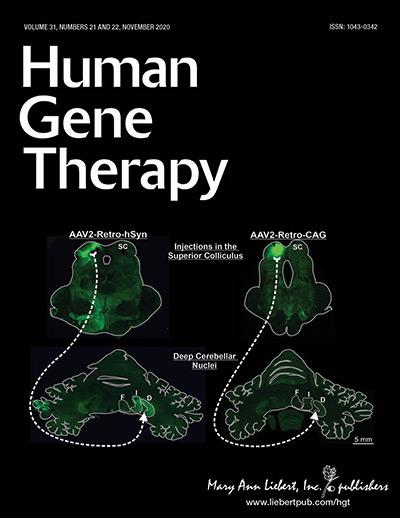
Credit: Mary Ann Liebert, Inc., publishers
New Rochelle, NY, December 15, 2020–A new study identified an adenovirus gene therapy vector carrying a VEGF isoform. It can improve uterine blood flow in placental insufficiency, as reported in the peer-reviewed journal Human Gene Therapy. Click here to read the full-text article free on the Human Gene Therapy website through January 15, 2021.
Reduced uterine blood flow and lack of bioavailable VEGF due to placental insufficiency is a major cause of severe fetal growth restriction (FGR). This is untreatable and causes serious neonatal morbidity and death.
Anna David, UCL Institute for Women’s Health, and colleagues tested different VEGF isoforms on endothelial cells from four species, including from human umbilical vein. The results support the use of the best performing VEGF isoform “in a human clinical trial for FGR caused by placental insufficiency.”
“The placenta is one of the most critical and uniquely physiologically adapted structures in human anatomy. The work by Dr. David and her group moves forward an important new gene therapy approach to restoring the vascular integrity of the placenta when it is impaired and thereby protecting fetal health,” according to Editor-in-Chief of Human Gene Therapy Terence R. Flotte, MD, Celia and Isaac Haidak Professor of Medical Education and Dean, Provost, and Executive Deputy Chancellor, University of Massachusetts Medical School.
###
About the Journal
Human Gene Therapy, the Official Journal of the European Society of Gene and Cell Therapy and eight other international gene therapy societies, was the first peer-reviewed journal in the field and provides all-inclusive access to the critical pillars of human gene therapy: research, methods, and clinical applications. The Journal is led by Editor-in-Chief Terence R. Flotte, MD, Celia and Isaac Haidak Professor of Medical Education and Dean, Provost, and Executive Deputy Chancellor, University of Massachusetts Medical School, and an esteemed international editorial board. Human Gene Therapy is available in print and online. Complete tables of contents and a sample issue are available on the Human Gene Therapy website.
About the Publisher
Mary Ann Liebert, Inc., publishers is known for establishing authoritative peer-reviewed journals in many promising areas of science and biomedical research. Its biotechnology trade magazine, GEN (Genetic Engineering & Biotechnology News), was the first in its field and is today the industry’s most widely read publication worldwide. A complete list of the firm’s 90 journals, books, and newsmagazines is available on the Mary Ann Liebert, Inc., publishers website.
Media Contact
Kathryn Ryan
[email protected]
Original Source
https:/
Related Journal Article
http://dx.




